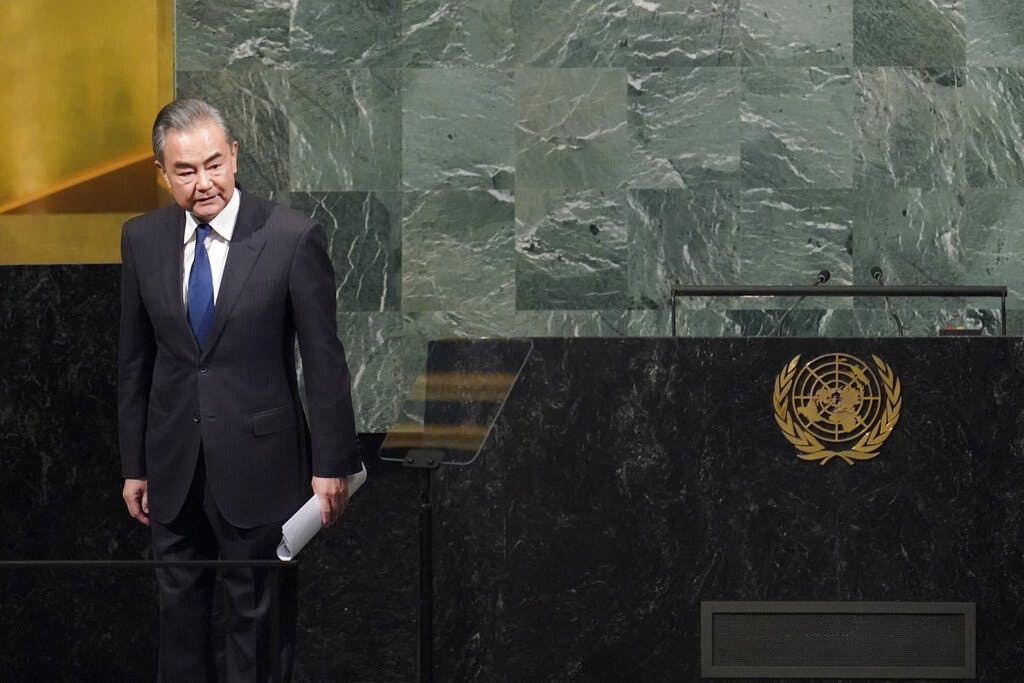‘It Is Better To Lose a Thousand Troops Than an Inch of Land’
During UN week in New York, Communist China’s foreign minister makes it clear that reunification with Taiwan is nonnegotiable.

Communist China’s foreign minister is spending UN week in New York arguing that Taiwan’s reunification with mainland China is nonnegotiable — and that U.S.-China relations are at an all-time low.
The minister made it clear the Communist Party is willing to fight for Taiwan if necessary: “It is better to lose a thousand troops,” Wang Yi told Henry Kissinger in a private meeting, as reported by Chinese state media, “than to lose an inch of land.” In a speech at the Asia Society, he also warned the U.S. to back down and get its relationship with China “onto the right track.”
Mr. Wang’s message comes at a particularly tense time between America and China, and his remarks offer insight into Chinese Communist Party thinking and posture toward the United States. These comments come against the backdrop of China’s escalating military moves in the Pacific, including in the Taiwan Straits, and serious efforts in Congress to elevate and arm Taiwan to historic levels.
“Taiwan independence, like a highly destructive ‘gray rhino’ charging toward us, must be resolutely stopped,” Mr. Wang stated at the Asia Society. “The Taiwan question arose as a result of weakness and chaos in the nation, and it will be resolved as national rejuvenation becomes a reality…. The U.S. should choose to stand on the right side of history.”
In the same speech, Mr. Wang argued that America has been two-faced on the issue of Taiwan. On the one hand, he argued, successive administrations have “made an unequivocal commitment to recognizing Taiwan as part of China.”
On the other hand, he continued, “the U.S. side went back on its word and passed the Taiwan Relations Act, followed by the so-called internal ‘Six Assurances,’ constantly fudging and hollowing out the one-China principle.”
The contradictory nature of U.S. policy was a theme he hit repeatedly in his Asia Society speech. You say you want peace and cooperation, he said, but “how will the U.S. deliver on its promise of not aiming to change China’s system, when it has framed a false narrative of ‘democracy versus authoritarianism?’”
“How can a new Cold War be prevented,” he continued, “when the U.S.has identified China as the primary rival and the most serious long-term challenge [and] engaged in all-round containment?”
“This is self-contradictory,” he concluded, “in both logic and reality.”
U.S.-China relations are at an all time low, he said, and “the message” he is here to “send, loud and clear, is that now is the time to make serious reflections and get back onto the right track.”
Mr. Wang called for “mutual respect, peaceful coexistence, and win-win cooperation.” Mutual respect, he said, means accepting that “China will not become another United States, and the U.S. cannot mold China to its liking.” Western systems were tried, he said, but “failed to fit China’s realities.”
Only “by adapting Marxism to the Chinese conditions,” Mr. Wang said, has China been able to “eradicate absolute poverty for the first time in the country’s history.” Marxism, he also claimed — preposterously, given the complete lack of democracy or human rights in China — has “brought true human rights and democracy to the Chinese people.”
Mr. Wang continued his doublespeak, suggesting that the communists “by integrating electoral democracy with consultative democracy, and procedural democracy with substantive democracy, have advanced a whole-process people’s democracy that has won the people’s full support.”
Wang Li also stressed in his Asia Society speech that it was “completely unnecessary” to fear that “China will export its ideology and threaten the values of other countries.” He said China “has no history of preaching to or lecturing others, and has no intention to export its system or path today.”
“Expansion, coercion, and hegemony,” he continued, “are never in the veins of the Chinese people. On the contrary, the Chinese believe in the ancient wisdom that ‘a warlike state will eventually perish,’ and ‘a hegemonic state is doomed to fail.’”
“For 70-plus years since the founding of the People’s Republic,” he noted, “China has never provoked a conflict, occupied one inch of foreign soil, started a proxy war, or joined any military bloc.”

